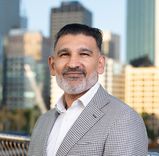
Affy Bhatti
•26 Feb 2024
•8 min read
Australia’s global payment system needs to face its anti-immigrant problems

This article was published by startupdaily on 12 February 2024. Click here to read the article.
A slew of recent media reports from around the world have confirmed what we and many of our friends and family have known for a very long time as immigrants to a predominantly white and western country: there is a “built in” penalty for being brown and from somewhere else when it comes to banking.
The Consumer Financial Protection Bureau, a US agency, recently flagged a host of issues facing immigrants when it comes to financial institution discrimination and accessibility, some of which can lead immigrants to fringe, and often predatory, payment and shadow banking solutions.
In the UK, discriminatory practices caused Nigel Farage, not typically seen as a friend of migrants, to become an unlikely consumer banking advocate as awareness grows at the widespread practice against migrants and others of “debanking,” the term for accounts closed for no defensible reason.
And in Australia, a man trying to transfer $30 for his nephew’s ninth birthday was informed by St George Bank to contact its economic and trade sanctions team in order to complete his transaction because of his innocent use of a religious word in the payment reference.
These reports, however, only scratch the surface. Even when they do try to understand the immigrant experience when it comes to established payment systems, they tend to think in pigeon holes about immigrants — to the frustration of almost every immigrant we know.
For example, we’re immigrants. And while we share some similarities, we, like so many Australian immigrants, couldn’t be more different in the significance of our origin stories.
One of us bet everything on the long shot of becoming an Australian — a leap of faith that forever changed his life and the life of his family. The other was born in England and initially, at least, his immigration choice was more sun and lifestyle than existential. These distinctions and many other tend to get lost in the media — and as a result the fundamental, baked-in inequities facing far too many Australian immigrants get lost too.
These inequities aren’t just about “different sounding” names so much as they are about geographies and an invisible worldview that shapes remittances, the term for sending money to family and friends back home.
Over the past two years, we have had the opportunity to dive deep into the global payment system and found to our sadness, but not surprise, that this system blatantly rewards those from the “developed” world while penalising pretty much everyone else.
Not only does this systemic monetary discrimination hurt immigrant wallets, it perpetuates disenfranchisement as immigrants understandably seek alternative paths to getting much needed, sometimes life saving funds, to loved ones in their country of origin.
Call it “payment profiling” or “geographical blacklisting” (“brownlisting” may be more apt) but the costs and hurdles to moving funds from here to many countries are ridiculously prohibitive.
While it’s worth acknowledging that some of this profiling might exist because of a country’s historic instability or problematic financial system, current technical and governance reasons are likely inadequate to fight discrimination. Countries fall into roughly three categories: well served, underserved and unserved.
Money is transferred instantly, inexpensively and hassle free to senders and receivers in well served countries. It’s not so instant or inexpensive to underserved countries – money can take longer to be sent and costs more to send.
How much more?
Here are some examples of the cost disparities: send $500 to the UK and it will cost you $2.93, but send the same amount to Pakistan, it will cost you $4.22 or $6.38 to Vietnam, $7.13 to Egypt, $11.17 to South Africa and a whopping $12.75 to Botswana. Then there are the unserved, those countries where migrants face the distress of not being able to send money at all – their only option being shadow channels.
In the face of all this, immigrants do what immigrants do best, they endure, they work around, they get things done. But they’re clearly getting a raw deal and putting themselves at risk. Left unaddressed, this problem is unlikely to change anytime soon.
Not when the World Bank cites lack of population density as a key driver of the price disparities (fine maybe for rural parts of the world, but for Islamabad, Cairo or Nairobi?), and it and others advocate education around choice of providers as a future driver of lower fees.
But this issue is much bigger than payments. In fact, it’s much bigger than immigrants.
It touches all of us, naturalised or not, because what is at stake is the larger integrity and transparency of the system we live in now and the system we are building for future generations. Will it reflect us or will it imprison us?
A few weeks ago a colleague ran the City2Surf. Afterward, he responded to the offer to locate his face in a crowd of 80,000 others using AI. An uploaded selfie and mere milli-seconds later and there he was, detected 47 times, sometimes in such a sea of faces that he struggled to pick himself out.
What do payments or the fate of society have to do with this?
Well, both represent digital ecosystems that are shaped by technological processes that in many cases no one properly understands, processes prone to being trained on established, often subtle, bias – processes that will be powered by a technology, like artificial intelligence, more powerful than anything we have ever encountered as human beings.
The clear, entrenched biases at play in global payments are a clue that other baked-in biases exist and these will likely be adopted by whatever technologically driven systems come next to manage our financial and physical lives.
Australia may never reach China’s level of individual scrutiny reflected in its pervasive social scoring system, but we have every reason to find and replace features of our current system that are non-inclusive.
Let’s start with payments by responding as a nation to this inequity against immigrants and finding a way to address it together.
Affy Bhatti and Mo Zaatar are migrants, venture builders and technologists across fintech and healthtech.
754 views
Recent Posts
See All



